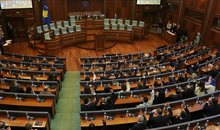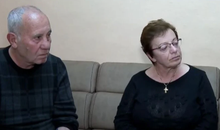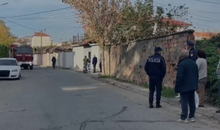
 Flash News
Flash News
Fight between teenagers, 15-year-old ends up in hospital
Kosovo Assembly constitution, proposal for secret ballot fails
Serious accident on the Peqin-Elbasan axis, two people seriously injured
'Fight, fight, fight'/ PD-ASHM towards historic victory, LaCivita mobilizes the campaign at the meeting with the candidates
Car hits pedestrian on Korça - Pogradec road, 43-year-old woman dies
The Guardian: The migrant agreement with Albania has turned into a political disaster for Meloni

A multimillion-dollar migration deal between Italy and Albania was presented by European Commission president Ursula von der Leyen as a new model for how to set up processing and detention centers for asylum seekers outside the EU.
The facilities in Albania were supposed to hold up to 3,000 men caught in international waters while crossing from Africa to Europe. But it seems that neither von der Leyen nor Italy's far-right prime minister, Giorgia Meloni, had taken the existing law into account.
Only a month after the much-hyped opening, only 24 asylum seekers have been sent to Albania and none remain there now; five spent less than 12 hours in a detention center, while the rest stayed for just over 48 hours.
All were transferred to Italy after Italian judges ruled it illegal to detain them in Albania before repatriating them to countries, such as Bangladesh and Egypt, considered "safe" by Rome.
In doing so, the judges were upholding an October 4 ruling by the European Union's court of justice (ECJ) that a country outside the bloc could not be declared safe unless its entire territory was deemed safe.
Italy's embarrassment over the scheme, attacked by opposition parties as a "total failure" that will cost around €1bn (£830m) over five years, has sparked a row between authorities and judges, who have been accused by parties of the extreme right.
However, observers say Meloni and her allies knew from the start that there was a risk the deal would not work, with the ECJ ruling just one of many legal issues. Chiara Favilli, professor of European Union law at the University of Florence, said: "Since 1993, several European states have proposed solutions similar to Italy's agreement with Albania. However, they are always rejected. Agreements like the one between Albania and Italy are incompatible with some basic norms".
Months before the signing of the agreement between Albania and Italy, many NGOs, academics and experts had raised doubts whether it could be considered humane or even legal under international law.
Their calls were ignored. Supporters insisted the scheme was more humane than sending people to developing countries, as the last UK government's flagship deportation scheme would have done, with the Italian state responsible for the men's fate and compliance with certain norms, and more less problematic than the EU's current practice of giving money to North African countries to improve their border controls.
As it looks set to face further legal challenges, however, the deal is becoming a fiasco. According to a recent poll, 55% of Italians dislike him.
Credibility is at stake for a government that has made immigration a central campaign issue and has in the past criticized predecessors for spending public money on managing the migration crisis. (Transport by sea on an Italian military ship to the eight men who arrived in Albania last weekend cost €250,000 – more than €31,000 per asylum seeker on board.)
In the face of the gradual collapse of the deal, the Italian government has launched a frank attack against the judiciary, describing those who ruled against the deal as "politicized magistrates" who "would like to abolish Italy's borders".
Last week, police strengthened protection for Silvia Albano, one of the six judges of the Rome court's immigration section, who on October 18 did not certify the detention of asylum seekers in Albania. She has received death threats since the verdict.
Stefano Musolino, deputy prosecutor of Reggio Calabria and member of the national association of magistrates, said: "What is not understood is that if a judge were to authorize the repatriation or detention of migrants in Albania, contrary to international laws that bind Italy, their verdicts would be illegal."
At a time when the government is struggling to balance the budget - by cutting funding for education, health and social security - opposition parties have described the deal as a "financial disaster".
Elly Schlein, the leader of the Democratic Party of Italy, said: "Meloni raises taxes and wastes almost a billion euros of taxpayers' money in immigrant centers in Albania. We could have used them to strengthen the national health service where more than 4.5 million people are unable to get treatment every year. Now it's time for Meloni to dismantle the centers. Then, it's time for her to apologize to all Italians." Adapted from The Guardian.
Latest news


DP candidate: Patronage agents follow us in cars during electoral meetings
2025-05-01 22:40:28



Forza Italia MP: Only Sali Berisha as Prime Minister can lead Albania to Europe
2025-05-01 21:29:47

For those who were scared by Tomorr Alizoti
2025-05-01 21:05:21
Berisha challenges Rama: You promised free healthcare, come here and keep it!
2025-05-01 20:56:58



The six best foods against stomach bloating
2025-05-01 20:04:09


Zelensky: We want peace, Russia responds with attacks
2025-05-01 19:22:07

Berisha: The contract in the US is not just for the DP, but for every Albanian!
2025-05-01 19:08:14
Fight between teenagers, 15-year-old ends up in hospital
2025-05-01 18:44:17






Demi Moore named the most beautiful woman in the world for 2025
2025-05-01 17:34:10
Waltz to step down as Trump's national security adviser
2025-05-01 17:24:25

What has Albania exported the most?
2025-05-01 16:49:18
Accident at 9-story building in Tirana, two injured
2025-05-01 16:47:16
How is lifestyle affecting health? Expert: Addictions are causing malnutrition
2025-05-01 16:32:09
Kosovo Assembly constitution, proposal for secret ballot fails
2025-05-01 16:22:35

Britain in talks with France and Saudi Arabia on recognizing Palestinian state
2025-05-01 15:57:30

Russian drones strike major cities in Ukraine
2025-05-01 15:39:45
Farmers in difficulty, Egyptian potatoes outstrip Steblevë's
2025-05-01 15:31:36
Serious accident on the Peqin-Elbasan axis, two people seriously injured
2025-05-01 15:15:25
Inaugurated a few months ago, Zhupa: Handball stadium, dangerous for children
2025-05-01 15:10:19
Eurostat: Albanians are paid less, but have the longest working hours in Europe
2025-05-01 14:57:32
The most effective vitamins for strengthening the immune system
2025-05-01 14:53:06

May 1/ Workers in Kosovo protest for their rights, demand wage increases
2025-05-01 14:33:55

Roven Zeka met in the cell, SPAK investigates 4 police officers, phones seized
2025-05-01 14:17:09




Xhaferri: Pro-Rama polls are manipulated by incinerator payments
2025-05-01 13:23:16
51-year-old woman disappears in Kukës, search begins
2025-05-01 13:02:20

Fallen in England, 32-year-old woman dies after falling from parachute
2025-05-01 12:44:54





Staged explosion in Elbasan, head of family wanted asylum in the EU
2025-05-01 11:17:10
Muzhaqi: ChatGPT prepared a very beautiful speech for me
2025-05-01 11:11:29
Berat Prosecution seeks 6 years in prison for pedophile who molested a minor
2025-05-01 10:53:00

TNT explosion in Elbasan, police react: Cameras have filmed the perpetrator
2025-05-01 10:28:31
7x7 doesn't make 6 million for us, but 33 thousand euros!
2025-05-01 10:23:13

TNT explosion in an apartment in Elbasan
2025-05-01 10:03:01
Accident on the "Memaliaj-Krahës" axis, 71-year-old man loses his life
2025-05-01 09:44:45


Vehicle bombed in Tirana, explosives placed in front tire
2025-05-01 09:10:30

Car hits pedestrian on Korça - Pogradec road, 43-year-old woman dies
2025-05-01 08:39:39
Sunshine and temperatures up to 30 degrees Celsius, weather forecast
2025-05-01 08:21:48
Today is Workers' Day, what does May 1st represent?
2025-05-01 08:05:44
Posta e mëngjesit/ Me 2 rreshta: Çfarë pati rëndësi dje në Shqipëri
2025-05-01 07:55:45
Journalist: Rama used the money to lobby for himself, not for Albania
2025-04-30 22:54:10
Kurti's invitation to constitute the Assembly, PDK responds, LDK refuses
2025-04-30 22:36:18











Fiscal peace or electoral coup?! Businesses owe 1.6 billion euros to the state
2025-04-30 18:59:05


Finland passes law banning cell phones in schools
2025-04-30 18:00:25

Italian court overturns Hysaj's conviction, Albanian defender fined 40,000 euros
2025-04-30 17:32:13


Minerals deal with US could be signed within next 24 hours, Ukraine confirms
2025-04-30 16:53:19

Stress at the office can be more dangerous than smoking!
2025-04-30 16:18:54
